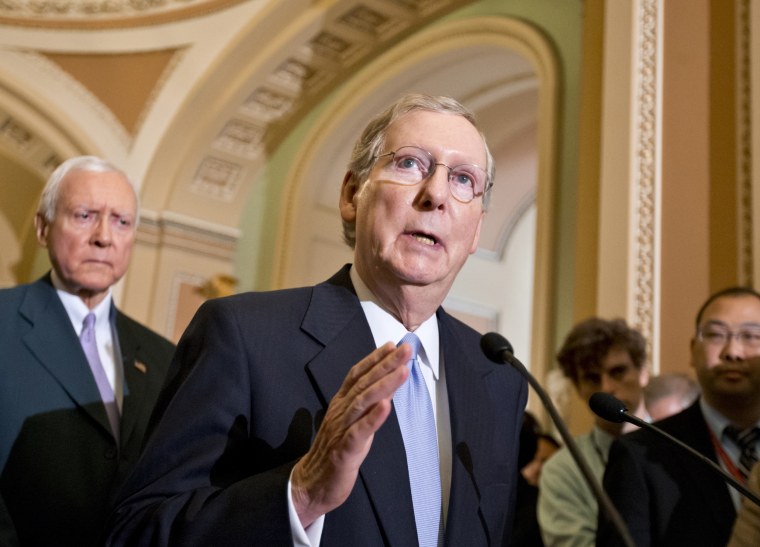WASHINGTON — Facing the prospect of leaving Washington for a month-long recess without any substantial legislative achievements, Senate Majority Leader Mitch McConnell Tuesday announced he is delaying the start of the traditional August recess this year by two weeks.
McConnell's decision comes after members of his own party asked him to delay the five-week long break from Washington as a long list of GOP priorities pile up, including a stalled health care bill — even as new details emerged about a revised health care plan.
“In order to provide more time to complete action on important legislative items and process nominees that have been stalled by a lack of cooperation from our friends across the aisle, the Senate will delay the start of the August recess until the third week of August," McConnell said in a statement released to reporters Tuesday afternoon.
The revised schedule will mark the first time since 1994 that the Senate has postponed its August break. That year, the Senate was scheduled to leave for its recess around Aug. 6 but postponed it in order to work on health care, among other issues, according to the Senate historian. The chamber worked until Aug. 25 then returned on Sept. 12.
Meanwhile there were new developments Tuesday on the GOP health care bill, a revised version of which is expected on Thursday. More money has been proposed to treat opioid addition and for the state stabilization fund to help people afford their health care with subsidies. Also being added is a measure that allows people to use their pre-tax income deposited into Health Savings Accounts on insurance premiums, something that is currently not allowed. Finally, a 3.8 percent tax on the wealthy will not be repealed, giving Republicans an estimated $170 billion over ten years to fund their health care bill. Eliminating those taxes has been a prime goal of many conservative members of the House and Senate, but Democrats have hammered the bill for cutting benefits for the poor while bestowing more money on the rich.
"Now some people may say we’re going to take this bogus argument of, you know, you’re giving tax cuts to the rich and cutting Medicaid to the poor," said Sen. John Cornyn, R-Texas, the second ranking Republican. "It’s a bogus argument, but [we're] trying to take one sharp stick off the table in that regard."
Missing from the proposed changes to the bill, at least for now, are any adjustments to the cuts in Medicaid spending, which would be a slight to the more moderate Republicans who have said that the current proposal cuts the program too deeply.
One major component that remains up in the air is a proposal by two GOP senators, Ted Cruz of Texas and Mike Lee of Utah, that would allow states to offer scaled-down health care plans that don't offer robust health coverage.
Republicans hope to hold a vote on health care next week, but the recess delay gives them more time. They have yet to secure one major legislative accomplishment in the first six months that they have controlled both bodies of Congress and the White House.
Eight senators, most of them newly elected, held a news conference Tuesday morning before McConnell announced his decision, calling on McConnell to cancel the recess. They noted that with the August break, only 31 legislative days exist until the end of the fiscal year on Sept. 30 and there remains a long to-do list. There was no immediate word on whether the House will also delay its scheduled recess.
"I certainly support what he's doing," said Sen. David Perdue, R-Ga., who was one of the members who suggested a delayed recess. "We've got a lot of work to do: the debt ceiling, the budget and appropriations and then we've got to move onto tax."
In addition to health care, Senate Republicans hoped to be further along on tax reform at this point in the year, but a handful of GOP leaders are still working out the main points of any plan. The party must also lift the debt ceiling, something that is often rife with political brinksmanship; conservatives are mostly opposed to allowing the federal government to increase the amount it is able to spend. Plus, the Congress has yet to pass the standard appropriations bills that fund the government for the next fiscal year.
"It was mixed," Perdue said of the reaction by GOP senators during their weekly lunch, when they were told of McConnell's decision.
"I was going to Israel with a bunch of new members but I guess I'm not now," said Sen. Lindsey Graham, R-S.C., discussing his now-cancelled plans for the first weeks of August.
Republicans who support the delay insist that staying in Washington longer in August is not an attempt to avoid meeting face-to-face with constituents. Republicans have been holding fewer town halls recently as attendees are angry about health care.
Sen. Bill Cassidy, R-La., said, however, that time away from home is time away from constituents.
"I'm also a big believer in speaking with constituents is important. So folks say we should have town halls and yet want us to stay here more often, so there is a mutually exclusive aspect to that," Cassidy said.
Sen. Patty Murray of Washington, the third-ranking Democrat in the Senate, said her party would not object to a delay. "Democrats are here any day that he tells us we are in session to fight for our constituents against their health care plan," she said. "I don't care if that's August or December."


